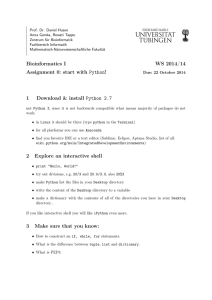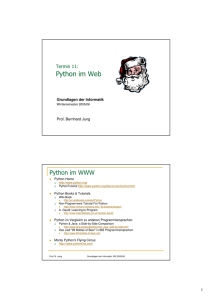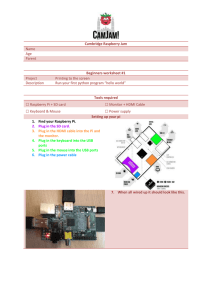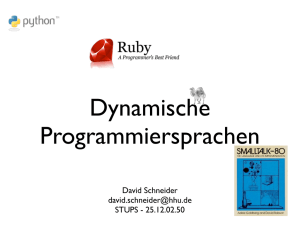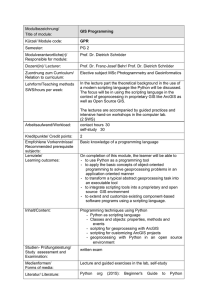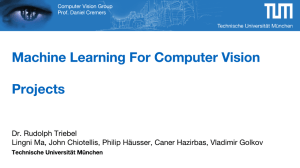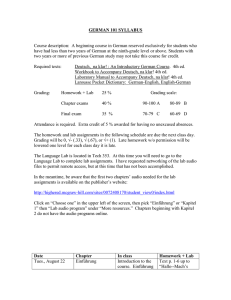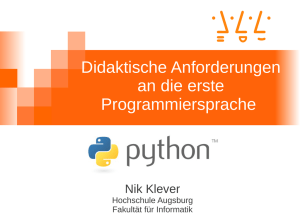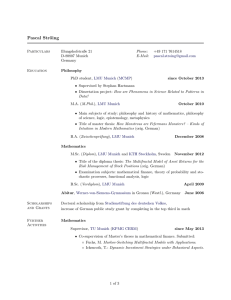2 Multimedia Programming with Python and Pygame
Werbung
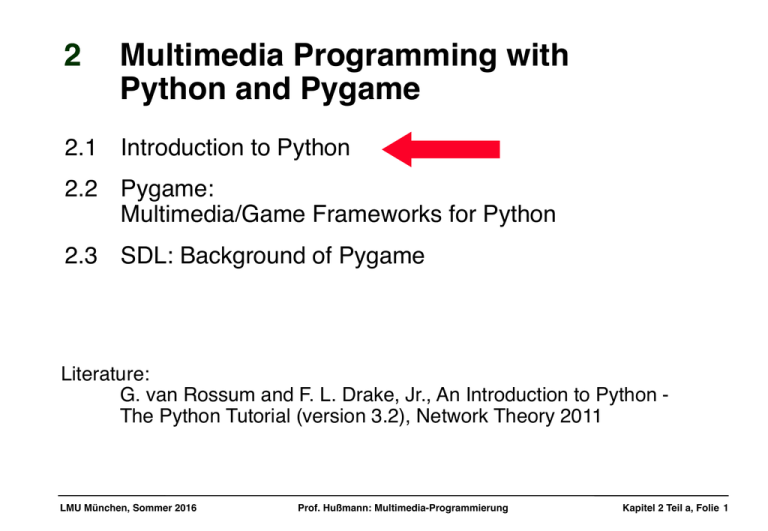
2
Multimedia Programming with
Python and Pygame
2.1 Introduction to Python
2.2 Pygame: Multimedia/Game Frameworks for Python
2.3 SDL: Background of Pygame
Literature:
G. van Rossum and F. L. Drake, Jr., An Introduction to Python The Python Tutorial (version 3.2), Network Theory 2011
LMU München, Sommer 2016
Prof. Hußmann: Multimedia-Programmierung
Kapitel 2 Teil a, Folie 1
• Guido van Rossum, 1991, CWI Amsterdam
• Now open source, current main versions:
– 2.7.11 and 3.5.1
• Targeted at programming novices
QUIZ:
How is the foot related to Python?
• Characteristics:
– Interpreted scripting language
– Compiled to intermediate byte code (similar to Java)
– Multi-paradigm language: imperative/structured, object-oriented, functional, aspect-oriented
– Dynamic typing
– Automatic garbage collection
• Do you really understand all these terms?
Images: Wikipedia
LMU München, Sommer 2016
Prof. Hußmann: Multimedia-Programmierung
Kapitel 2 Teil a, Folie 2
Java to Python: Imperative Example (Java)
public class Main {
public static int sequentialSearch(int q, int[] a) {
for(int i = 0; i < a.length; i++) {
if(a[i]==q) {
return i;
}
}
return -1;
}
public static void main(String[] args) {
int[] a = {11, 22, 33, 44, 55, 66};
System.out.println("Array a: "+a);
System.out.println("Search for 55: "+sequentialSearch(55,a));
System.out.println("Search for 23: "+sequentialSearch(23,a));
}
}
LMU München, Sommer 2016
Prof. Hußmann: Multimedia-Programmierung
Kapitel 2 Teil a, Folie 3
Java to Python: Imperative Example
(Python)
def sequentialSearch (q, a):
for i in range(0,len(a)):
if a[i]==q:
return i
return -1
a = [11, 22, 33, 44, 55, 66]
print("Array a: ", a)
print("Search for 55: ",sequentialSearch(55,a))
print("Search for 23: ",sequentialSearch(23,a))
QUIZ:
What are the differences to Java?
LMU München, Sommer 2016
Prof. Hußmann: Multimedia-Programmierung
Kapitel 2 Teil a, Folie 4
First Observations on Python
• Very compact code
• Data types are not specified
• Powerful but simple built-in list datatype
• Indentation (white space) is important for program semantics !!!
– Block levels given by indentation
– What is done in Java with {} brackets, is done here with indentation
• Example: A different (wrong!) algorithm:
def sequentialSearch (q, a):
for i in range(0,len(a)):
if a[i]==q:
return i
return -1
LMU München, Sommer 2016
Prof. Hußmann: Multimedia-Programmierung
Kapitel 2 Teil a, Folie 5
Scripting Language
• Traditionally: A scripting language is a programming language that is used to control
some application software
– Command languages for operating systems
– Task automatization in user interfaces
– Scripts for Web browsers, word processors, spreadsheet software, …
• Historically, considered slow in execution and limited in program size
• Modern general-purpose scripting languages
– Have inherited many features from traditional scripting languages
– Are considered as full application programming languages:
– Examples: Rexx, Perl, Python, Ruby
LMU München, Sommer 2016
Prof. Hußmann: Multimedia-Programmierung
Kapitel 2 Teil a, Folie 6
Compilation, Interpretation and Others
Program
Input
Compiler
Machine
code
Input
Machine
code
Interpreter
Output
Compilation
(Example: C)
Output
Interpretation
(Example: Python)
Variations:
Program
• Compilation to intermediate code (Java)
• Just-in-time compilation
• Internal compilation to intermediate code
in interpreter (Python/ CPython)
LMU München, Sommer 2016
Prof. Hußmann: Multimedia-Programmierung
Kapitel 2 Teil a, Folie 7
Interactive Interpreter
• Interpreted languages can easily be executed line-by-line
• Interactive execution is helpful for understanding
– See BASIC, Logo etc.
LMU München, Sommer 2016
Prof. Hußmann: Multimedia-Programmierung
Kapitel 2 Teil a, Folie 8
Static and Dynamic Typing
• Type checking:
– Simple, automatically executable form of proof for program correctness
(in certain limited respects)
– Avoids operations to be applied to unsuitable arguments
• Static typing:
– Type information is checked before execution of program (at compile time)
– Program code has to specify (explicitly or implicitly) types for all variables
– Examples: Java, Pascal, C, Standard ML
• Dynamic typing:
– Type information is checked during execution of program
(at run time)
– Type information for variables only exists after value assignment
– Examples: Smalltalk, Python, JavaScript
• In practice, static and dynamic tying are sometimes mixed:
– See the dynamic type check for downcast operations in Java!
LMU München, Sommer 2016
Prof. Hußmann: Multimedia-Programmierung
Kapitel 2 Teil a, Folie 9
Strong and Weak Typing
• Surprisingly ill-defined terms!
– Do not take this classification too serious!
• Strong typing:
– Basic idea: “Strong” typing provides no (or only very limited) possibility to
evade the restrictions of the type system
– Examples of strongly typed languages:
Java, Pascal, Standard ML, Python
• Weak typing:
– Implicit type conversions
– Type conversions with undefined result
– Examples of weakly typed languages:
Visual Basic, C, JavaScript
LMU München, Sommer 2016
Prof. Hußmann: Multimedia-Programmierung
Kapitel 2 Teil a, Folie 10
Duck Typing
“When I see a bird that walks like a duck and swims like
a duck and quacks like a duck, I call that bird a duck.“ James Whitcomb Riley
• The type of an object is determined only by the fact whether it has the
features required from it.
• Appropriate for object-oriented programming languages with dynamic
types - like Python.
LMU München, Sommer 2016
Prof. Hußmann: Multimedia-Programmierung
Kapitel 2 Teil a, Folie 11
String Operations in Python
Operations valid for all sequence types:
(str is the string object)
• Indexing: str[5]
• Negative indexing: str[-5] (counting from the end)
• Slicing: str[2:5], str[:5], str[2:6:2], str[::-1]
– Omitted index is begin or end, third value is step size (covers reversion)
• Operations:
len(str), min(str), max(str), x in str
Numerous methods specific for strings like:
–
–
–
–
–
–
–
–
–
capitalize()
count(substr)
find(substr)
isalpha()
partition(sep)
replace
split(sep)
upper()
title()
LMU München, Sommer 2016
Prof. Hußmann: Multimedia-Programmierung
Kapitel 2 Teil a, Folie 12
Lists in Python
• List: Sequential collection of objects (of arbitrary, also varying type)
• Can be easily used as stack or queue data structures
• Flexible creation of lists e.g. by list comprehension:
l = [3*x for x in range(1,4)]
• Lists are mutable (can be even changed through slices)
• List methods:
–
–
–
–
–
–
–
–
–
append
count
extend
index
insert
pop
remove
reverse
sort
LMU München, Sommer 2016
Prof. Hußmann: Multimedia-Programmierung
Kapitel 2 Teil a, Folie 13
Sets in Python
• Set: Unordered collection without duplicates
• Constructor
– set builds a set from a list
• Basic mathematical operations for sets:
–
–
–
–
Union (|)
Intersection (&)
Difference (-)
Symmetric difference (^)
• Example:
set('multimedia') & set('programming')
LMU München, Sommer 2016
Prof. Hußmann: Multimedia-Programmierung
Kapitel 2 Teil a, Folie 14
Java to Python: Imperative Example
(Python)
def sequentialSearch (q, a):
return q in a
a = [11, 22, 33, 44, 55, 66]
print(a)
print("Array a: ", a)
print("Search for 55: ",sequentialSearch(55,a))
print("Search for 23: ",sequentialSearch(23,a))
LMU München, Sommer 2016
Prof. Hußmann: Multimedia-Programmierung
Kapitel 2 Teil a, Folie 15
Tuples and Dictionaries in Python
• Tuple: immutable collection of objects (of arbitrary type)
N = ('max','muster')
N = 'max','muster'
Strange: One-element tuple written as 'max',
• Easy unpacking of tuples:
vorname, nachname = ('max','muster')
• Dictionary: Mutable collection of object maps (of arbitrary type)
age = {'anna':23, 'max':22}
– Key entries can only be of immutable type (strings, numbers, tuples)
– Key entries must be hashable
– Main purpose: indexed access age['anna']
• Constructor accepts lists or generator expressions:
dict((x, x*x) for x in range(0,5))
LMU München, Sommer 2016
Prof. Hußmann: Multimedia-Programmierung
Kapitel 2 Teil a, Folie 16
Java to Python: Object-Oriented Example
(Java)
public class Counter {
private int k = 0;
public void count () {
k++;
}
public void reset () {
k = 0;
}
public int getValue () {
return k;
}
}
LMU München, Sommer 2016
Prof. Hußmann: Multimedia-Programmierung
Kapitel 2 Teil a, Folie 17
Java to Python: Object-Oriented Example (Python)
class Counter:
Initialization (constructor)
def __init__(self):
self.k = 0
def count(self):
self.k += 1
def reset(self):
self.k = 0
def getValue(self):
return self.k
LMU München, Sommer 2016
Prof. Hußmann: Multimedia-Programmierung
Instance variable k
“Self” parameter is
implicit in method calls
but explicitly mentioned
in declaration
Kapitel 2 Teil a, Folie 18
Constructing Objects, Invoking Methods
• Example:
c = Counter()
print(c.getValue())
c.count()
c.count()
c.count()
print(c.getValue())
LMU München, Sommer 2016
Prof. Hußmann: Multimedia-Programmierung
Kapitel 2 Teil a, Folie 19
Inheritance in Python
class LimitCounter(Counter):
def __init__(self, limit):
self.k = 0
self.limit = limit
def count(self):
if self.k != self.limit:
self.k += 1
In contrast to Java, Python allows multiple inheritance!
LMU München, Sommer 2016
Prof. Hußmann: Multimedia-Programmierung
Kapitel 2 Teil a, Folie 20
Python Modules
• Module: A file containing Python definitions and statements
– File name is module name with suffix .py
– Module name is available as global variable __name__
– Statements in a module are executed when the module is imported
(initialization)
• Importing a module m:
import m
– Accessing a definition f() in m:
m.f()
from m import *
– Accessing a definition f() in m:
f()
LMU München, Sommer 2016
Prof. Hußmann: Multimedia-Programmierung
Kapitel 2 Teil a, Folie 21
Why Python in This Lecture?
Python is not a specific multimedia language!
We will use a simple Python-binding for a
multimedia/gaming framework…
Generally, knowing Python is a good thing –
to get programming tasks done easily.
LMU München, Sommer 2016
Prof. Hußmann: Multimedia-Programmierung
Kapitel 2 Teil a, Folie 22
